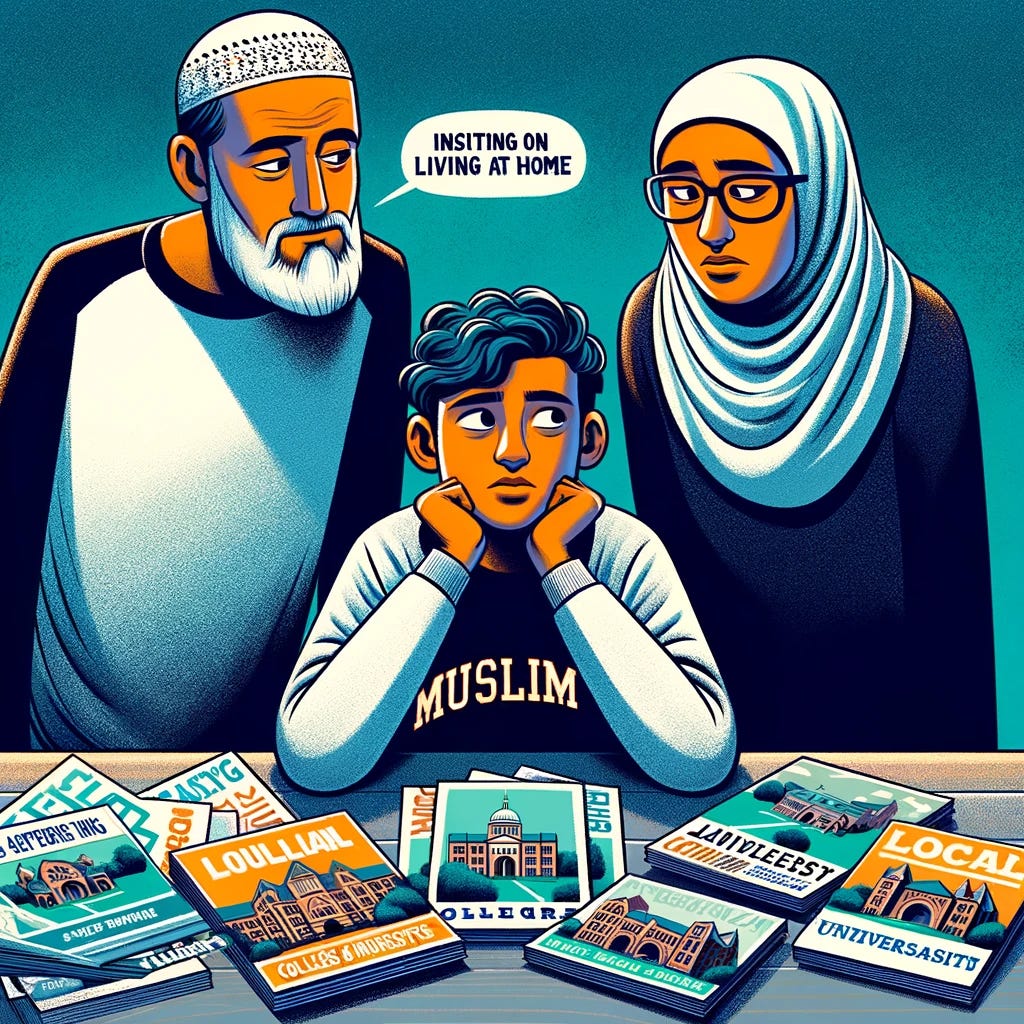FBF #51: 11 Mistakes Muslim Families Make When Applying to College
A roadmap to steer clear of the most common college admissions traps
College admissions coaches like me don’t exist in most parts of the world.
In other countries, the university admissions process is straightforward and transparent. Here in the States, however, the process is opaque and confusing. Contradictory advice abounds, and it is easy to get buried by information overload.
Muslim families are faced with additional challenges. Even though their children are American born and bred, many Muslim parents did not attend college in the States and thus do not have a sophisticated understanding of the nuances of the American educational system.
Many Muslim families additionally struggle with the balancing act between preserving one's faith and identity and embracing the opportunities that higher education offers.
While many challenges of applying to college are faith agnostic, after working with hundreds of Muslim families over the last decade, I have seen the same missteps made again and again.
For this week’s FBF, I have broken away from my usual five point format and instead extracted the 11 most common “mistakes” I see Muslim families make during the college application process.
1) Insisting on living at home
One of the distinctive features of the college search for many Muslim families is the insistence that their children live at home during the college years. By restricting their applications solely to local institutions, these students significantly narrow their pool of potential colleges and inadvertently immerse themselves in highly competitive applicant pools.
I understand where they are coming from. College can be a very difficult place to maintain your Muslim identity and practice. Shaytaan has many arrows in his quiver that he deploys during the college years. For a student who has been in the Muslim “bubble” since kindergarten, the transition to a college campus can be disorienting. Depending on the child, staying home to protect your imaan may make sense.
That said, if I had lived at home while studying at Harvard, I would have halved the benefit of my time there. College is about much more than what you learn in the classroom. It is about discovering who you are at your core and building a lifelong network of friends and professional connections. At some point, we have to take the “training wheels” off of our children and let them develop the spiritual backbone to practice the deen when not under our watchful eyes.
2) Not visiting campuses
I am shocked by how haphazard the college search is for many Muslim families. They see some schools listed in US News and World Report, do a few Google searches, and then apply to 15-20 random schools.
The single best way to figure out if a college is right for you is to visit the campus, ideally when classes are in session. During spring break of my junior year, I went on an epic road trip visiting Middlebury, Princeton, Swarthmore, and Haverford with my father. It is one of the first things I remembered when he died last year.
This trip gave me real clarity about what I was looking for in a college. Many colleges have fly-in programs that allow you to visit campuses for free. They are opportunities to add depth to your search. Take advantage of them.
At the very least, be sure to attend the admitted student events at your top 2-3 schools before depositing. NEVER sign away four years of your life to a campus you have never seen in person.
3) Starting too late
Did you know that senior year is the LEAST important of the four years of high school when it comes to admissions decisions? And yet, many Muslim families don’t get serious about the application process until the second half of junior year.
Starting the college process too late is one of the single biggest mistakes that I see families make again and again.
Most students tread a path through high school that consists of haphazard wanderings with little planning. They dabble in many different courses, interests, and extracurriculars and are left scrambling to find a way to present colleges with a cohesive narrative. Getting expert advice during the early high school years can prove invaluable.
The principle of starting early is built into the name of my company, Five Before College. Students and families who start planning for college starting five years before college are infinitely better prepared.
4) Emphasizing resume virtues over eulogy virtues
Résumé virtues are the skills you bring to the marketplace. Eulogy virtues are the ones that are talked about at your funeral — whether you were kind, brave, honest, or faithful.
In admissions terms, the résumé virtues show up on your transcript and activities list in the form of APs and leadership positions, but the eulogy virtues can be found in your essays and recommendation letters.
Résumé virtues are much easier to teach and measure, and most students focus on developing them first. The tweak here is not to discount the importance of résumé virtues—your transcript is the single most important part of your application—but to FIRST develop a rock-solid moral core of eulogy virtues that will be your guiding light when making decisions throughout high school.
One way to achieve this. Every time you see your reflection in the mirror, make the du’a the Prophet (SAWS) recommended, “O Allah, just as you have beautified my body, similarly beautify my character.”
5) Focusing on prestige over fit
One of the biggest mistakes that Muslim families make is one that I was once guilty of myself: focusing on institutional prestige over fit.
My father passed on his addiction to elite education to me. When I first began helping Muslims with the college process, my slogan was that we prepare students for the “Akhira and the Ivy League.”
For some students, an Ivy League school is the perfect fit, but many others would be miserable there even if they managed to gain entrance. There are SO many wonderful, life-changing schools that I have discovered since becoming a college counselor. It is often better to be a “big fish in a small pond” at a school where you can truly excel than to base your decision purely on a set of rankings.
As a Muslim community we need to recognize and move beyond our elitist blind spot when it comes to college education. We need to stop letting status concerns pollute our perceptions of college diplomas and remember that we will not be judged on the Day of Judgement on the prestige of our degree or the number of zeroes in our bank balance. Attending in-state public universities, state colleges, or even community college often makes the most sense, and these paths should be respected.
6) Not researching Muslim campus life
College campuses vary wildly in the quality and depth of their services and support for Muslim students on campus. Some have full-time chaplains, halal food in all the dining halls, and a dynamic MSA. Others don't even have a proper musalla, and Muslims are left to fend for themselves during Ramadan.
Before committing to spend 4 years at a particular college, you should find out how many people attend jumma on campus, the size and structure of the MSA, the ease of access to halal food and local masjids, and whether they have single-sex or substance-free housing options.
Islamophobic incidents have soared since the conflict in Gaza, and some campuses are much more welcoming of Muslim students than others. My good friend Salman Khan runs Muslim Campus Life, an excellent resource for Muslims as they explore college.
7) Dismissing alternative paths
We must never lose sight that there are many pathways to success. Over time, I have come to believe college itself is not the right path for everyone. I reckon a good 20% of the students I have worked with would be much better served by going to trade school or pursuing a vocation.
By the age of 20, someone who has pursued a career as an electrician is already earning a good income. Once they join a union, they are in great shape financially and essentially have job security for life. Blue collar workers are able to get married early, build a significant nest egg, and do a job where success is tangible.
So many Muslim families try to force their child’s square peg into the round hole of college when other, non-academic paths make much more sense.
8) Applying for only the most competitive majors
Applying to college is somewhat of a game, and you need to understand how the game works to succeed. The laws of supply and demand are just as much in play in college admissions as they are in other parts of life.
When you apply to the most popular majors—biology, engineering, computer science—you are stacking the deck against yourself. If you have been coding since the womb, have won national physics competitions, or have spent summers pursuing competitive internships in a healthcare setting, then of course you have a decent shot of getting into one of these majors.
But if your interest in medicine or engineering is more of a vague desire with no coursework and extracurricular experience to support it or if you are only pursuing these things because your parents said you should, you would be much better off pursuing a less common major.
When people ask me to give their children a small piece of advice to help them stand out in college admissions, my simple answer is: “Be different. When they zig, you zag.”
9) Becoming a cook rather than a chef
In the culinary world, there's a critical distinction between being a chef and being a cook. A cook is someone who follows established recipes, relying on tried and tested methods without much room for innovation. A chef is someone who reasons from first principles, like a scientist in a kitchen, experimenting with raw ingredients to create something new and unique.
Most high school students adopt a “cook” mindset towards academic and personal development by looking for predefined formulas for success. While this might yield some short-term success, it's essential to shift your mindset to that of a “chef.”
Becoming a “chef” in high school is a lot like making an award-winning meal on Chopped. You are given a disparate group of “ingredients”—a love of pickleball, social justice, anime, and 14th century Moorish architecture–and are asked to create a cohesive whole. Initially stumped, you eventually organize a pickleball tournament to raise money for Palestinian refugees and create an anime-style YouTube video introducing your classmates to the palace at Al-Hambra.
These recipes could only exist in one cookbook: your own.
10) Focusing on the destination rather than the journey
Many families make the classic mistake of focusing on the destination rather than the journey. They are chasing after the shadow of the Ivy League or other top 20 schools. All their decisions are Machiavellian calculations about what will look best to their dream college.
High school life for these students can be downright miserable. They are weighed down under the tyranny of more—pursuing a grueling path of countless APs, endless extracurriculars, and constant pressure. They are following the same well-worn playbook that every other high school overachiever uses.
So what is the solution? Stop chasing the shadow of college and turn towards your inner light. Stop focusing on the destination, namely a specific admissions outcome, and start focusing on the high school journey.
If you focus on pursuing your authentic intellectual passions, exploring your idiosyncratic quirks, and drinking in the noor of Islam, a happy byproduct will be that colleges will be running after you and begging for you to enroll.
11) Focusing too heavily on academics
Muslim students and parents fundamentally misunderstand the role of grades in college admissions. Grades or board scores might open the door to the top 20 schools, but they alone will NEVER push you through it. Every year Harvard and Yale gleefully boast about how many high school valedictorians and students with 1600s on their SATs they have rejected.
Many immigrant parents are relentless in browbeating their children about grades. This obsession clips their children’s wings and prevents them from developing in other categories that are heavily weighted in “holistic” admissions decisions.
As I like to remind families—“all work and no play make Jalal a dull applicant.”
Until next Friday…
As always, if you made it to the end and found this article beneficial, please click the heart button to show me some love. And I’d love to hear in the comments about any other mistakes you see families making in the admissions process.









Thank you for posting the audio version. Was listening while doing chores.
Listened to the audio version because I am recovering from a bad cold and can’t look t the screen right now. Thank you for posting this.